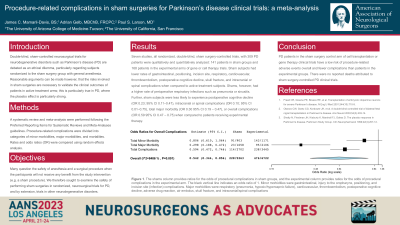Procedure-related complications in sham surgeries for Parkinson’s disease clinical trials: a meta-analysis
Procedure-related Complications in Sham Surgeries for Parkinson’s Disease Clinical Trials: A Meta-analysis
Friday, April 21, 2023


James C. Mamaril-Davis, BS
Medical Student (MS3)
The University of Arizona College of Medicine
Tucson, Arizona, United States
ePoster Presenter(s)
Introduction: Double-blind, sham-controlled neurosurgical trials for neurodegenerative disorders are debated as an ethical dilemma, particularly regarding subjects randomized to the sham surgery group with general anesthesia. The safety of sham procedures in the context of Parkinson's disease (PD) neurosurgical trials has not been explored extensively in a formal analysis.
Methods: A systematic review and meta-analysis were performed following the Preferred Reporting Items for Systematic Reviews and Meta-Analyses (PRISMA) guidelines. Rates and odds ratios were compared using random effects analysis.
Results: Seven studies, all randomized, double blind, sham surgery-controlled trials, with 309 PD patients were qualitatively and quantitatively analyzed. There were 141 PD patients in sham groups and 168 patients in the experimental arms of stem cell transplantation or gene therapy trials. Sham subjects were less likely to experience gastrointestinal (OR 0.94; 95% CI 0.62–1.43), positioning (OR 0.87; 95% CI 0.56–1.36), incision site (OR 0.47; 95% CI 0.21–1.05), perioperative respiratory (OR 0.09; 95% CI 0.01–1.58), perioperative cardiovascular (OR 0.79; 95% CI 0.30–2.09), perioperative thromboembolism (OR 0.10; 95% CI 0.01–1.85), postoperative cognitive decline (OR 0.23; 95% CI 0.11–0.47), skull fracture (OR 0.59; 95% CI 0.11–3.27), and intracranial or spinal complications (OR 0.10; 95% CI 0.01–0.75) when compared to active treatment subjects. Shams, however, were more likely to experience perioperative respiratory infections such as pneumonia or sinusitis (OR 1.14; 95% CI 0.28–4.63). There were no reported injuries to the oropharynx, adverse drug reactions, air emboli, or mortalities related to anesthesia or procedures in either group.
Conclusion : PD patients in the sham surgery control arm of cell transplantation or gene therapy clinical trials have a low risk of procedure-related adverse events overall and fewer complications than patients in the experimental groups. There were no reported deaths attributed to sham surgery-controlled PD clinical trials.
Methods: A systematic review and meta-analysis were performed following the Preferred Reporting Items for Systematic Reviews and Meta-Analyses (PRISMA) guidelines. Rates and odds ratios were compared using random effects analysis.
Results: Seven studies, all randomized, double blind, sham surgery-controlled trials, with 309 PD patients were qualitatively and quantitatively analyzed. There were 141 PD patients in sham groups and 168 patients in the experimental arms of stem cell transplantation or gene therapy trials. Sham subjects were less likely to experience gastrointestinal (OR 0.94; 95% CI 0.62–1.43), positioning (OR 0.87; 95% CI 0.56–1.36), incision site (OR 0.47; 95% CI 0.21–1.05), perioperative respiratory (OR 0.09; 95% CI 0.01–1.58), perioperative cardiovascular (OR 0.79; 95% CI 0.30–2.09), perioperative thromboembolism (OR 0.10; 95% CI 0.01–1.85), postoperative cognitive decline (OR 0.23; 95% CI 0.11–0.47), skull fracture (OR 0.59; 95% CI 0.11–3.27), and intracranial or spinal complications (OR 0.10; 95% CI 0.01–0.75) when compared to active treatment subjects. Shams, however, were more likely to experience perioperative respiratory infections such as pneumonia or sinusitis (OR 1.14; 95% CI 0.28–4.63). There were no reported injuries to the oropharynx, adverse drug reactions, air emboli, or mortalities related to anesthesia or procedures in either group.
Conclusion : PD patients in the sham surgery control arm of cell transplantation or gene therapy clinical trials have a low risk of procedure-related adverse events overall and fewer complications than patients in the experimental groups. There were no reported deaths attributed to sham surgery-controlled PD clinical trials.
